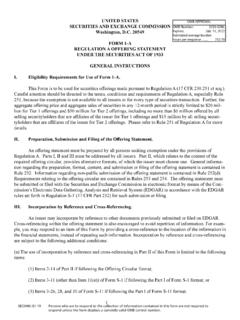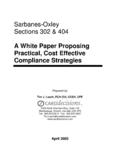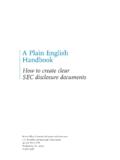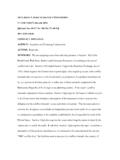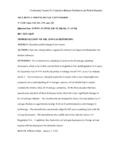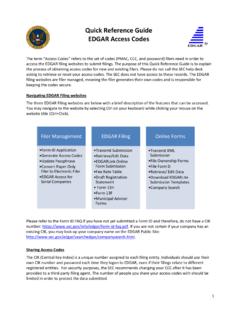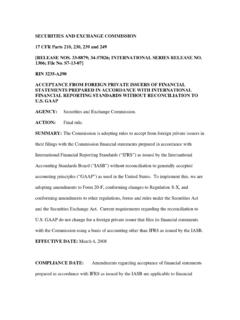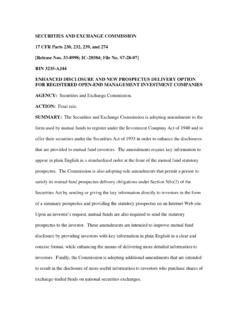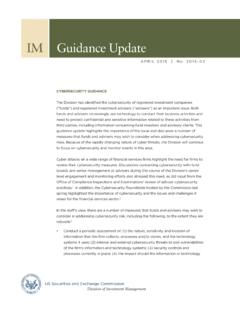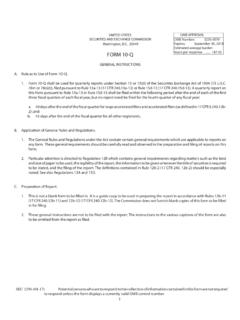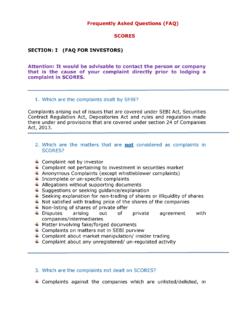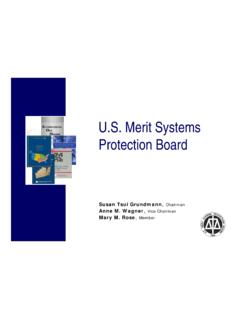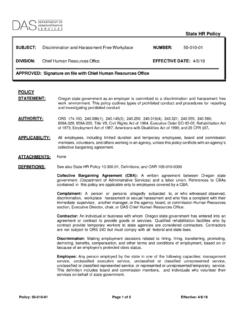Transcription of I. GENERAL ANTI-FRAUD PROVISIONS - SEC.gov | HOME
1 EXISTING REGULATORY PROTECTIONS. UNCHANGED BY EITHER 3606 OR S. 1933. These protections apply to ALL public companies, including Emerging Growth Companies *. I. GENERAL ANTI-FRAUD PROVISIONS . A. Duty to Disclose All Material Information Rule 12b-20 of the Securities Exchange Act of 1934 (the Exchange Act ) requires that companies must, in addition to providing the information expressly required in a report or other statement to the Securities and Exchange Commission ( SEC ), include any additional material information that may be necessary to make the required statements not misleading in light of the circumstances. B. Liability for False and Misleading Statements section 18 of the Exchange Act imposes liability for false and misleading statements in documents filed with the SEC to any person who makes such false or misleading statements, subject to applicable defenses. C. Exchange Act section 10(b) and Rule 10b-5 These PROVISIONS broadly prohibit fraudulent and deceptive practices and untrue statements or omissions of material facts in connection with the purchase or sale of any security.
2 Unlike section 18, these PROVISIONS apply to any information released to the public by the issuer and its subsidiaries, including press releases and annual and quarterly reports to shareholders. D. Executive Officer Certification of Reports and Financial Statements As discussed in more detail below, a company's certifying officers can be held personally liable for any untrue statement of material fact or material omission necessary to ensure that statements contained in the reports or other statements to the SEC are not misleading. E. Control Person Liability section 20 of the Exchange Act and section 15 of the Securities Act of 1933 (the Securities Act ) provide that a person controlling any person liable under those statutes may be liable jointly and severally and to the same extent as its controlled person for violations of the Exchange Act or the Securities Act. F. Liability for Securities Offerings Sections 11 and 12 of the Securities Act impose liability for any material misstatements or omissions made in connection with registered offerings conducted under the Securities Act.
3 section 5(b)(1) of the Securities Act prohibits the use of any prospectus that does not satisfy SEC. requirements. In addition, section 5(b)(2) of the Securities Act prohibits any registered sale of a security unless the security is preceded or accompanied by a prospectus that satisfies SEC requirements. II. SEC DISCLOSURE AND REPORTING OBLIGATIONS. A. Regulation FD Public companies must comply with Regulation FD's prohibition on selective disclosure of material nonpublic information. B. Limitations on Use of Non-GAAP Financial Measures Regulation G and Item 10(e) of Regulation S-K provide specific requirements for the presentation of any financial measures that are not in compliance with generally accepted accounting principles ( GAAP ). Non-GAAP financial measures must not be misleading and must include a reconciliation to the most nearly comparable GAAP measure. C. Annual Reporting (Form 10-K) Under section 13(a)(2) of the Exchange Act, Companies must, within 90 days of the end of each fiscal year, file with the SEC.
4 Annual reports that include: 1. Audited Financial Statements a. Companies must provide (i) audited balance sheets, (ii) audited financial statements of income and cash flows and (iii) summary financial data. b. As indicated above, all financial statements must be prepared in accordance with, or reconciled to, GAAP. 2. Description of the Company's Business Regulation S-K requires annual reports to include (i) a description of the company's business, including segments, geographic areas, and competitors; (ii) risk factors affecting the business; (iii) pending legal proceedings; (iv) mine safety disclosures; (v). information about directors and officers, including their compensation and any related party transactions; (vi) management's discussion and analysis of financial condition and results of operations ( MD (vii) a description of material contractual obligations, (viii) and discussions of off-balance sheet transactions and market risks. 3. Market Information Annual reports must also include information about the market for the company's common equity, related stockholder matters and company purchases of equity securities.)
5 4. Description of the Company's Corporate Governance Policies Annual reports must also disclose information about corporate governance polices and compliance with governance requirements such as (i) whether the company maintains a code of ethics for its principal executive officers, and if so, it must file such code with the SEC as an exhibit to its annual report; (ii) whether the company has at least one audit committee financial 2. expert; (iii) a description of company's leadership structure and why this structure is appropriate; and (iv) a description of risk oversight by the company's board and how such oversight is administered. D. Quarterly Reporting (Form 10-Q) Under section 13(a)(1) of the Exchange Act, public companies must, within 45 days after each of the first three fiscal quarters of each year, file with the SEC quarterly reports that include: 1. Condensed Financial Statements These interim financial statements are unaudited, but are reviewed by independent accountants and subject to Statement on Auditing Standard No.
6 100. 2. Additional Information Quarterly reports must update the annual report in several key areas including (i) MD&A; (ii) any changes in risk factors since the annual report; (iii) quantitative and qualitative disclosures about market risk; (iv) any material legal proceedings; (v) any changes in securities or defaults on senior securities; (vi) mine safety disclosure and (vii) any other materially important event not reported in previous current reports. E. Periodic Reporting (Form 8-K) Under section 13(a)(1) of the Exchange Act, public companies must file current reports with the SEC within four business days after the occurrence of a reportable event. 1. Reportable Events include events such as (i) the acquisition/disposition of significant assets; (ii) a change in auditors; (iii) any departure or resignation of directors or officers, (iv) material plans or contracts with officers and directors; and (v) many other events important to investors. F. Certification of Reports executive officer(s) and principal financial officer(s).
7 Must each make individual certifications on each annual and quarterly report. 1. Substance of Certification Certifying officers must certify that (i) such officer has reviewed the reports; (ii) based upon the officer's knowledge, the report does contain any untrue statement of material fact or material omission necessary to ensure that statements in the reports are not misleading; and (iii) based on such officer's knowledge, the financial statements, and other financial information included in the reports fairly present, in all material aspects, the company's financial condition and results of operations and cash flows. 2. Internal Control Over Financial Reporting Certifying officers are responsible for establishing, designing and maintaining effective internal controls, must annually assess and report on the effectiveness of the internal controls, and must disclose any change in the company's internal controls in annual and quarterly reports. 3. 3. Disclosure Responsibilities to the Board of Directors, Audit Committee and Independent Auditors Certifying officers must disclose to the board, audit committee and the company's auditors (i) all significant deficiencies and material weaknesses in the design or operation of internal controls and (ii) any fraud, whether or not material, that involves management or any other employee with a significant role in the company's internal controls.
8 4. Criminal Penalties Enforced Against Certifying Officers Certifying officers that knowingly or willfully certify a report that does not meet the standards summarized above face criminal penalties of up to 20 years in prison and $5 million in fines. G. Additional Requirements The federal securities laws also require public companies to comply with additional disclosure and reporting requirements: 1. Accounts and Accounting Controls section 13(b)(2) of the Exchange Act requires companies to keep books and records that accurately and fairly reflect transactions and dispositions of assets and to maintain a system of internal accounting controls sufficient to provide reasonable assurance that transactions are executed in accordance with management's authorization and related requirements. 2. Foreign Corrupt Practices Act section 30A of the Exchange Act prohibits public companies and any related persons acting on behalf of a company from bribing any foreign official, political party or candidate for political office for the purpose of obtaining or retaining business.
9 3. Prohibition on Personal Loans to Directors and Executive Officers . section 402 of Sarbanes-Oxley prohibits any issuer from directly or indirectly extending, maintaining or arranging credit in the form of a personal loan to or for any director or executive officer. 4. whistleblower Procedures and Rules section 301 of Sarbanes-Oxley requires audit committees to establish procedures for confidential and anonymous receipt, retention, and treatment of complaints received by the issuer regarding accounting, internal accounting controls, or auditing matters. In addition, under the Dodd-Frank Act of 2009, the SEC has adopted rules for a program under which monetary awards are given to whistleblowers who disclose fraud directly to the SEC. For successful enforcement actions resulting in monetary sanctions exceeding $1 million, whistleblowers are entitled to receive between 10% and 30% of the monetary sanctions paid to the SEC. 4. 5. Regulation M Companies must comply with Regulation M whenever they make or propose to make a distribution of their stock.
10 Under Regulation M, neither the company nor any of its affiliated purchasers . may bid for or purchase, or induce others to bid for or purchase, any company stock during the applicable restricted period unless a specified exception is available. 6. Self-Tenders Rule 13e-4 under the Exchange Act applies to any tender offer for a company's shares by the company or one of its affiliates. Under Rule 13e-4, the proposed purchaser must file with the SEC and promptly disseminate public disclosure regarding the proposed purchaser, the issuer and the offer. In addition, the offer must be held open for a minimum period, shareholders must receive withdrawal rights, and other requirements apply to such transactions. 7. Open-Market Repurchases Public companies typically rely on Rule 10b-18 under the Exchange Act to secure a safe harbor from the anti - manipulation requirements of the Exchange Act in connection with open- market bids and purchases made by an issuer with respect to its own shares. 8.
